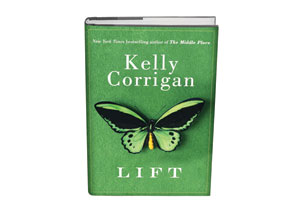Reading Questions for Lift
Warning: May contain spoilers

Photo: Ben Goldstein/Studio D
1. Before you read Lift , what did its title mean to you? Did that change when you completed the book?
2. Kelly Corrigan opens Lift with this quotation from the poet R. M. Rilke: "All things want to fly." What did you interpret this quote to mean? What do you think it means in the context of what Corrigan writes about in Lift ?
3. Corrigan spends many pages telling the story of her cousin Kathy and Kathy's son Aaron. What is the impact of witnessing a tragedy? How do we internalize the things that happen around us?
4. "I heard once that the average person barely knows 10 stories from childhood…" Corrigan writes (page 4). Does this statistic seem accurate according to your own experience? What does our early childhood mean if we cannot remember it? What is a pivotal memory from your childhood?
5. A friend of Corrigan's who likes to go hang-gliding once said to her: "Turbulence is the only way to get altitude, to get lift. Without turbulence, the sky is just a big blue hole. Without turbulence, you sink" (page 44). What does this statement mean to you? Is it always true or are some tragedies lift-less?
6. Corrigan characterizes parenthood as "a bold and dangerous" endeavor. She also encourages her single friend to launch herself into motherhood. Would you do the same?
7. If you were to write a letter to a loved one, as Corrigan has here, to whom would you address it? What would you say? What could you say in a letter that you wouldn't say face-to-face?
8. If you have read Corrigan's memoir The Middle Place , do you think that Corrigan's worldview is essentially tied to the events that unfolded in the year described in that book? Are we, in some ways, defined by our highest and lowest moments?
Read O 's review
Get more reading guides
2. Kelly Corrigan opens Lift with this quotation from the poet R. M. Rilke: "All things want to fly." What did you interpret this quote to mean? What do you think it means in the context of what Corrigan writes about in Lift ?
3. Corrigan spends many pages telling the story of her cousin Kathy and Kathy's son Aaron. What is the impact of witnessing a tragedy? How do we internalize the things that happen around us?
4. "I heard once that the average person barely knows 10 stories from childhood…" Corrigan writes (page 4). Does this statistic seem accurate according to your own experience? What does our early childhood mean if we cannot remember it? What is a pivotal memory from your childhood?
5. A friend of Corrigan's who likes to go hang-gliding once said to her: "Turbulence is the only way to get altitude, to get lift. Without turbulence, the sky is just a big blue hole. Without turbulence, you sink" (page 44). What does this statement mean to you? Is it always true or are some tragedies lift-less?
6. Corrigan characterizes parenthood as "a bold and dangerous" endeavor. She also encourages her single friend to launch herself into motherhood. Would you do the same?
7. If you were to write a letter to a loved one, as Corrigan has here, to whom would you address it? What would you say? What could you say in a letter that you wouldn't say face-to-face?
8. If you have read Corrigan's memoir The Middle Place , do you think that Corrigan's worldview is essentially tied to the events that unfolded in the year described in that book? Are we, in some ways, defined by our highest and lowest moments?
Read O 's review
Get more reading guides



